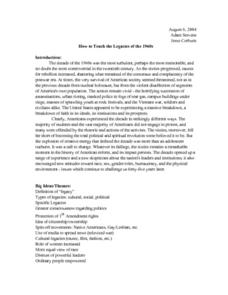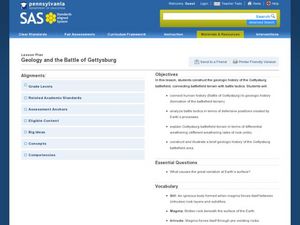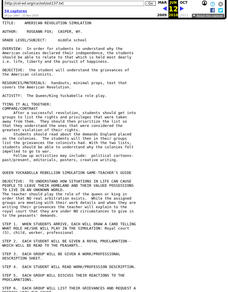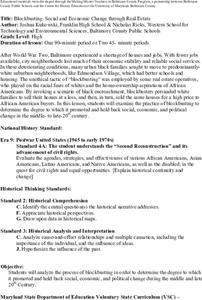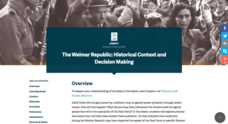Curated OER
The Fall of Fujimori
Students view a film about the fall of Peru's president. They develop possible solutions for governments to follow when dealing with terrorism. They work together to research civil liberty limitations put in place during war. They...
Curated OER
Give Peace a Chance
Students research protest songs of the Vietnam War era. They search for information on the artists and motivation for the lyrics. They interview people who remember the music from that era and bring back information they found.
Curated OER
How to Teach the Legacies of the 1960s
Students consider which aspects of world around them have roots in 1960s, research and compare 1960s to today with regards to Civil and Women's Rights, Vietnam, counterculture, music, voting, and economic rights, and explore legacy of...
Curated OER
The Battle of Gettysburg
Eighth graders participate in a basketball game that involves taking on the roles of Union and Confederate armies. In two teams, each wearing either gray or blue fabric strips, they attempt to capture their opponents and free their own...
Curated OER
Geology and the Battle of Gettysburg
Students create geologic maps of the Gettysburg battlefield. In this geologic skills lesson, students consider the variations of Earth's surfaces and explore strategies employed by the North and South in the Battle of Gettysburg to...
Curated OER
Abraham Lincoln's Position on the Question of Slavery and Its Extension
Learners read excerpts from Abraham Lincoln's speeches and letters between 1854 and 1861 and look for information relative to Lincoln's thoughts on the legal and Constitutional aspects of slavery.
Curated OER
Lincoln, the Great Emancipator?
Students examine the motivating factors that prompted Lincoln to draft the Emancipation Proclamation in 1863. They examine Lincoln's social and political beliefs, particularly as they pertained to slavery and race in the United States.
Curated OER
Freedom for All? The Contradictions of Slavery and Freedom in the Maryland
Students are be able to analyze the contrast between the rights and privileges referenced in the Declaration of Independence and the Maryland State Constitution in comparison to the rights and privileges of slaves. They are be able to...
Curated OER
Mystery State #51
In this mystery state worksheet, students answer five clues to identify the state in question. They then locate that state on a map.
Alabama Department of Archives and History
Marketing a Bad Idea: Why So Many People Joined the Klan in the 1920s
How did the Klu Klux Klan manage to gain so many members during the 1920s? Class members examine Klan documents and promotional materials to gain an understanding of the propaganda techniques used to attract members.
Albert Shanker Institute
Economic Causes of the March on Washington
Money can't buy happiness, but it can put food on the table and pay the bills. The first of a five-lesson unit teaches pupils about the unemployment rate in 1963 and its relationship with the March on Washington. They learn how to create...
Curated OER
Human Rights And Refugees: The Right To Asylum
Students read the Universal Declaration of Human Rights, define asylum and identify when people have the right to asylum. They examine specific cases of asylum in recent times and consider some of the difficulties refugees face.
Curated OER
American Revolution Simulation: Colonial History, Drama
Young scholars explain why the American colonies declared the independence, students should relate to that which is held most dearly i.e. life, liberty and the pursuit of happiness. They participate in a drama that illustrates this.
US House of Representatives
Keeping the Faith: African Americans Return to Congress, 1929–1970
The third lesson plan in a unit that traces the history of African Americans serving in the US Congress examines the period from 1929 through 1970. After reading a contextual essay that details the few African Americans elected to...
Center for History Education
Blockbusting: Social and Economic Change through Real Estate
"Redlining," "Blockbusting," and "White Flight" may not be terms familiar to young historians. Here's a lesson that introduces middle schoolers to these terms and the actions associated with them. Class members examine a series of...
Center for History Education
African Americans and the Democratic Party
Why did African American voters switch from the Republican Party to the Democratic party during the Depression Era? That is the question young historians attempt to answer as they study primary source documents from the period. The focus...
American Institute of Physics
African American Physicists in the 1960s
Physicists Herman Branson and Tannie Stovall provide young scholars with two very different perceptions of the status of African American physicists in the 1960s. After reading and comparing the bios of these two men, class members read...
US House of Representatives
Legislative Trends and Power Sharing Among Hispanic Americans in Congress, 1977–2012
Bilingual education, voting rights, and Congressional redistricting come up often in the news. Explore these topics from another view—the perspectives of Hispanic members of Congress. Activities include an article with comprehension and...
Facing History and Ourselves
Us and Them: Confronting Labels and Lies
Stereotyping and discrimination based on religion catalyze many atrocities in the world. Explain the awful treatment of Jews and the lies Nazis spread by using an informative yet sensitive resource. Learners participate in a warm-up and...
US House of Representatives
Black Americans in Congress Speak Their Mind
To conclude their study of Black Americans in Congress, groups select a statement made by one of the Members, examine the Member's profile on the provided link, and create a display that includes state represented, years of service, an...
Curated OER
The Crusades
Students investigate the series of religious wars known as the Crusades. In this Crusades instructional activity, students research Christian and Muslim beliefs and create posters that compare the two. Students discuss the causes of the...
Curated OER
The Truth Shall Set Them Free?
Students consider the notion and purpose of truth commissions, They work in groups to predict the commission's effectiveness in its efforts to promote peace and reconciliation among Liberians. Finally, students create found poems that...
Curated OER
America Enters WWII
Students analyze the attack on Pearl Harbor. For this World History lesson, students research the events that led to the attack of Pearl Harbor then discuss the what happened after the attack. They finish the lesson with writing a...
Curated OER
Human Rights Violations
Students define human rights and discuss examples of various human rights. They conduct Internet research, develop a list of human rights, and in small groups create a poster illustrating the class definition of human rights.
Other popular searches
- American Civil War
- Civil War Lesson Plans
- Civil War Inventions
- Civil War Reconstruction
- English Civil War
- Civil War Slavery
- Civil War Flags
- Civil War Battles
- The Civil War
- Civil War Literature
- Civil War and Reconstruction
- Causes of Civil War




